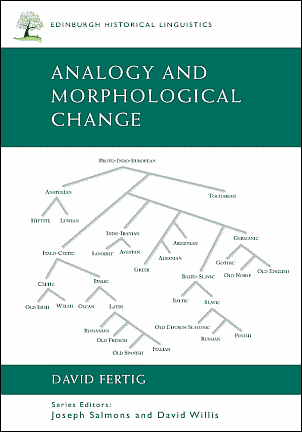2024-01-13 Sat
■ #5374. 類推および関連する過程を例示する英文 --- Fertig の冒頭より [analogy][backformation][folk_etymology][morphology][language_change][voicy][heldio]
一昨日の heldio で「#955. 妙な英文で味わうアナロジー(および関連する過程)」を配信した.本ブログでも同じ話題をカバーしておきたい.
「#4229. Fertig による analogy の定義」 ([2020-11-24-1]) や「#5336. Fertig による analogy の本格的研究書の目次」 ([2023-12-06-1]) で紹介した Fertig の analogy に関する研究書の冒頭は,次のような英文の例示で飾られる.
A book about analogy and morphological change? That is so not what I was expecting. I never imaginated there'd ever be such a book. I guess I had another thing coming. Who'd of thunk it?
この英文には類推 (analogy) およびそれと関連する言語革新の過程を示す事例が4つ(あるいは5つ)含まれている.すべてが類推の事例,あるいは類推に似ている事例である.それぞれを解説する1節も引用しておきたい.
The short paragraph above contains at least four recognizable examples of some of the different kinds of innovations that we will be exploring in this book. That is so not . . . is an example of analogical change in syntax. Until recently, the intensifier so could only be used directly before an adjective or adverb. Now some speakers regularly use it in other syntactic contexts, such as before the negative particle not. This change can be attributed to the analogy of other intensifiers such as really . . . . The next sentence contains the verb imaginate, which sounds very odd to many English speakers today but has been around since 1541. It means the same thing as the much more common and older verb imagine and may have been created by backformation from the noun imagination, on the analogical model of pairs like speculation--speculate, dedication--dedicate, etc. The fourth sentence contains an altered version of the familiar expression to have another think coming, meaning 'to be seriously mistaken about something'. For at least a century, English speakers/learners have sometimes mistaken the word think in this expression for thing. This kind of change is called folk etymology. It occurs when speakers identify one element in an expression with a different, often historically unrelated element. The word of (for 've) in the final sentence of the paragraph could also be considered folk etymology. Finally, thunk is obviously an innovative past-participle form corresponding to standard thought. It is based on analogical models such as sink--sank--sunk or stick--stuck.
ここから太字表記のものも含めいくつかキーワードと拾うと,innovations, analogical change, backformation, analogical model, folk_etymology などが挙がってくる.Fertig の本では,これらの用語や概念が丁寧に議論されていく.言語における類推(作用)の研究の必読書である.

・ Fertig, David. Analogy and Morphological Change. Edinburgh: Edinburgh UP, 2013.
Powered by WinChalow1.0rc4 based on chalow